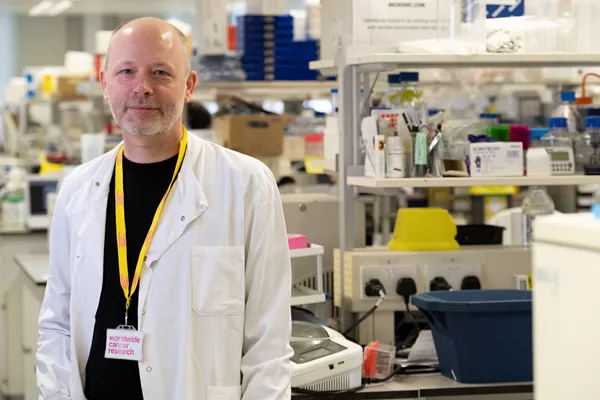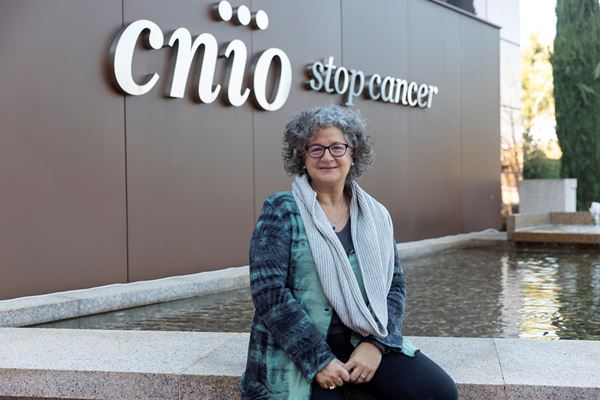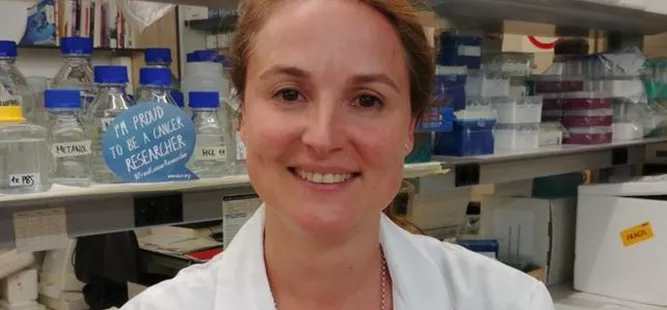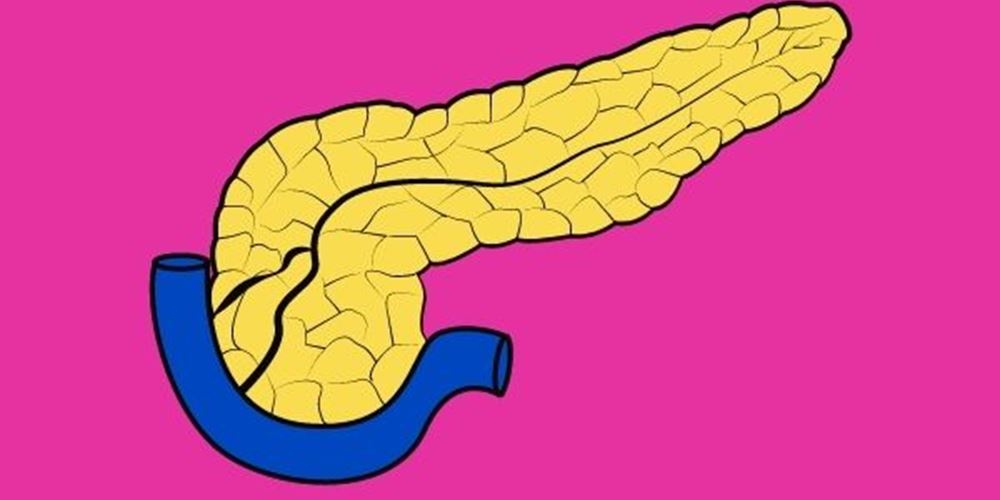Why haven't we cured pancreatic cancer yet?
8th November 2021
Pancreatic cancer is only the 9th most common cancer in the UK, and yet it is the 5th leading cause of cancer death: over 10,000 people died of pancreatic cancer in the UK in 2020. Sadly this aggressive disease has very low survival rates, and it continues to be one of the most difficult types of cancer diagnose and treat. But with your help we are funding exciting discovery research into pancreatic cancer that we hope will lead the way to future cures.
What is pancreatic cancer?
The pancreas is an organ that sits just behind your stomach and plays two important roles in your body: it produces hormones, including insulin, and it also produces enzymes, which are important for our digestive system.
The most common cancer that develops in the pancreas is called pancreatic ductal adenocarcinoma. This accounts for 90% of all pancreatic cancer cases, and it happens when cells that are part of the digestive function of the pancreas develop cancer.
500,000
In 2020, nearly half a million people worldwide were diagnosed with pancreatic cancer.
460,000
In 2020, over 460,000 people worldwide died from pancreatic cancer.
Why is pancreatic cancer so hard to cure?
Pancreatic cancer is hard to spot
One of the reasons pancreatic cancer is so difficult to treat is that it is hard to diagnose. Because the pancreas is located deep inside the body, tumours often go undetected until the cancer has spread to other parts of the body – known as metastasis. Once a cancer has metastasized, it is very difficult to cure.
Additionally, in the early stages of pancreatic cancer you might not have any symptoms, or they may be vague. Symptoms include things like indigestion, weight loss and fatigue, which are also symptoms of many other more common health conditions, making it hard to diagnose.
 Dr Miriam Martini, Pancreatic cancer researcher
Dr Miriam Martini, Pancreatic cancer researcher
Pancreatic cancer is defined as a “silent killer” because there are no specific symptoms in the early stages.
Pancreatic cancer is like a fortress
Another reason that pancreatic cancer is hard to treat is that when a tumour develops in the pancreas, it is often surrounded by thick scar tissue that makes treatment like chemotherapy less effective. Not only this, but this thick tissue prevents nutrients from entering the tumour – so the cells become especially strong to be able to survive in difficult conditions. This in turn makes the cells more resistant to chemotherapy drugs.
There's still so much we don't know about pancreatic cancer
There is still lots to learn about pancreatic cancer that will improve our ability to diagnose and treat the disease. That's why we're funding crucial research into understanding pancreatic cancer that our researchers hope will lead to new cures in the future.
 Prof Seth Coffelt, Pancreatic cancer researcher
Prof Seth Coffelt, Pancreatic cancer researcher
The problem with pancreatic cancer is that we know very little about how it develops, how it spreads, how it progresses – and this also prevents scientists from developing really good treatments in order to combat this disease.
How is Worldwide Cancer Research helping to find cures for pancreatic cancer?
Your support is helping incredible researchers around the world in their quests to answer these big questions about pancreatic cancer - and offer hope for new cures.
Right now Dr Miriam Martini and her team at the University of Turin are looking for the 'Achilles heel' of pancreatic cancer, finding a weak spot that they can use as a target for therapy.
At the University of Glasgow, Professor Seth Coffelt and his team are studying how the immune system might help or hinder the spread of pancreatic cancer.
And Professor Ildiko Szabo and her team at the University of Padova recently tested a combination of new and existing drugs on mice and discovered that by delivering this combination straight to tumours, they were able to completely eliminate pancreatic tumours without side effects.

Why is my support so important?
Thanks to the generosity of our Curestarters, Worldwide Cancer Research scientists were able to discover a potential new way to detect and diagnose pancreatic cancer early, by analysing microorganisms such as bacteria in a patient's stool sample.
Collaboration between Dr Nuria Malats at the Spanish National Cancer Research Centre and Dr Peer Bork from the European Molecular Biology Laboratory in Germany led to this potentially game-changing discovery, providing hope that a lifesaving diagnostic kit could be on the horizon.
Your support today will help bring forward the breakthroughs of tomorrow. Will you help us reach a day when no life is cut short by pancreatic cancer?
Yes! I want to be a Curestarter

Further reading

One in two people get cancer but I lost both my parents
When Adam lost his dad to pancreatic cancer in 2006, he was completely heartbroken. Suddenly his mum needed to become two parents in one – she was the glue that held the family together. But then their worlds fell apart again when she was diagnosed with cancer too.
11 September 2023

Hope for new pancreatic cancer treatments
New discovery paves the way to design new treatment combinations that could kill cancer cells while also making them more susceptible to chemotherapy.
03 March 2021

A recent discovery could be a starting point for new pancreatic cancer treatments
Researchers have discovered that a protein called Netrin-G1 plays a major role in the development and growth of pancreatic cancer.
18 November 2020

